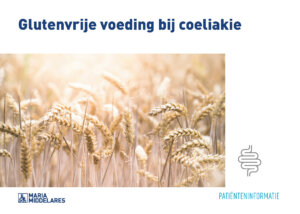Gluten intolerance
Symptoms and causes
Symptoms and causesWhat is it?
The small intestine is about five metres long and represents about 90% of the total contact area of the gastrointestinal system tract. The most important function of the small intestine is digestion and especially the absorption of food components into the bloodstream and the internal environment of our body.
Celiac disease or gluten enteropathy literally means ‘damage to the small intestine’ (i.e. enteropathy) by ingestion of gluten (i.e. protein components in e.g. wheat, rye, barley). This syndrome is caused by an abnormal immunological reaction (i.e. hypersensitivity reaction) of the body to gluten. This leads to deterioration of the first part of the small intestine, just past the stomach. This severely hampers the absorption of essential nutritional components such as fats, vitamins, iron and calcium. This situation is called ‘malabsorption syndrome’ and indicates deficits present in the body.
Symptoms
Typical symptoms of this condition are persistent diarrhoea (> three weeks), emaciation, general fatigue and lethargy, iron deficiency, osteoporosis and anaemia. However, the most typical feature of this disease is the often atypicality of the symptoms, which means that the diagnosis can easily be missed.
Diagnosis and treatment
Diagnosis and treatmentTesting and diagnosis
Targeted blood sampling with detection of specific antibodies (i.e. antibodies in the blood) may point in the direction of this disease, but a positive diagnosis can only be made through a gastroscopy (i.e. internal examination of the stomach and first part of the small intestine), by taking tissue pieces (i.e. biopsies) from the first part of the small intestine. These tissue pieces are then examined under the microscope and, in the case of celiac disease, a flattened intestinal structure is typically found — the so-called ‘villus atrophy’.
Treatment
The treatment consists mainly of a gluten-free diet, in addition to supplements, vitamins, iron, calcium, etcetera to replenish the deficiencies and to prevent significant long-term effects. Finally, first-degree relatives (parents, siblings, children) of a celiac patient should also be screened for the disease through targeted blood tests.
More information
Further information can be obtained from the website of the Flemish Celiac Disease Association: https://www.coeliakie.be/
.
Only available in Dutch:

Glutenvrije voeding bij coeliakie
DownloadTreatment centres and specialisations
Treatment centres and specialisations
Latest publication date: 02/08/2024
Supervising author: Dr Monsaert Els
Something wrong or unclear on this page? Report it.
Supervising author: Dr Monsaert Els








